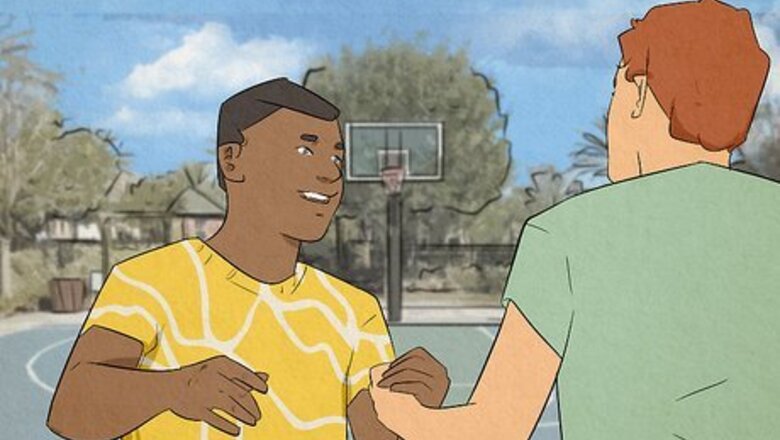
views
- “I’m down” is a slang phrase that means you agree to do an activity and go somewhere with a friend.
- Saying, “I’m down” can mean you are sad, upset, disappointed, or unhappy about something.
- “I am down” can also mean that you are sick or feel unwell, like “I’m down with a cold.”
“I’m Down” Meanings and Examples
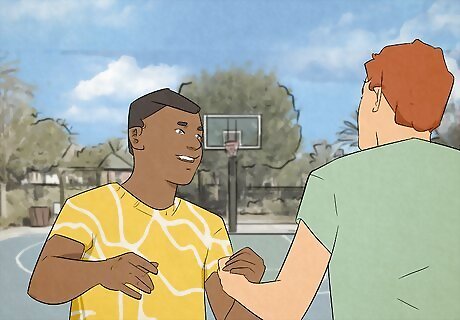
“I’m down” means you agree to go somewhere or do an activity. This casual, slang phrase tells your friends or family members that you’re willing and excited to go along with an activity they suggest. You might say, “I’m down” when a friend asks you if you want to get dinner with them or go with them on a vacation. Your friend: “I’m hungry for pizza. Do you want to try that new restaurant with me?” You: “I’m down! I’ll never say no to pizza.” Your friend: “I have an idea. Let’s plan a trip to Italy!” You: “I need a vacation, so yes, I’m down!” Your friend: “What do you think about surprising Lola for her birthday?” You: “I’m so down. She loves surprises!” If a friend asks you if you simply want to hang out, you might say, “I’m down for anything.” This means you’re open and ready to do whatever they propose.
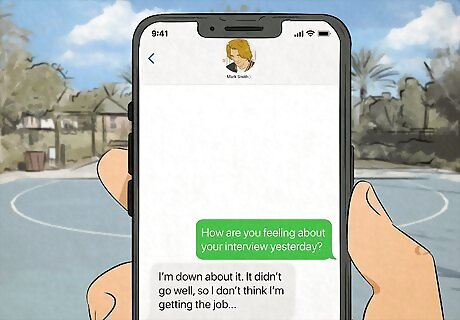
Saying “I’m down” can mean you feel sad. If you’re having a bad day and a friend asks you how you’re doing, you might tell them, “I’m down.” This phrase shows them that you’re feeling unhappy, upset, or disappointed about something. Your friend: “Hey, are you okay? You’re not very talkative today.” You: “I’m down. I found out my grandma is sick last night.” Your friend: “You don’t seem excited about the party after school.” You: “No, I’m down. My parents won’t let me go to the party anymore.” Your friend: “How are you feeling about your interview yesterday?” You: “I’m down about it. It didn’t go well, so I don’t think I’m getting the job.”
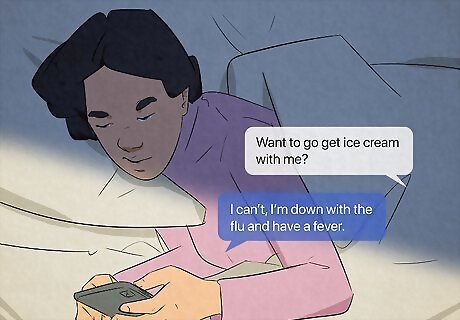
Tell people that you’re sick by saying “I’m down.” Whether you’re sniffling and coughing or you have the flu, saying, “I’m down” communicates to your friends and family that you’re feeling unwell. You might tell a friend that you’re ill to let them know that you can’t hang out anymore or to explain why you missed an event. Your friend: “Are you still coming to the movies with us tonight?” You: “No, I’m down with some food poisoning. I feel really bad.” Your friend: “Hey, where are you? We’re about to go to the party.” You: “I can’t make it anymore. I’m down with a really bad cold and don’t want to get anyone sick.” Your friend: “Want to go get ice cream with me?” You: “I can’t, I’m down with the flu and have a fever.”
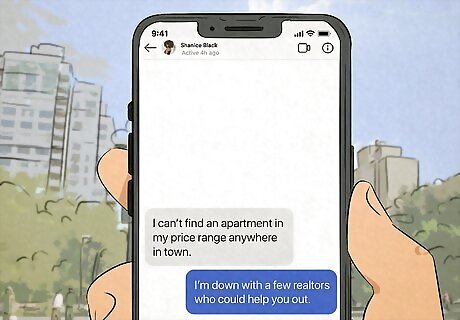
Explain that you’re friendly with someone by saying “I’m down.” Sometimes, “I’m down” means that you have a good relationship with someone. For example, you might let your pal know that you think your mutual friend is cool, or tell them that you know a group of people well. Your friend: “Have you met the new kid at school yet?” You: “Yeah, I’m down with Marco. We actually went to elementary school together. He’s a nice guy.” Your friend: “There are no more tickets for the concert. We should have got some last week.” You: “Oh, I’m down with José. He manages the show, so he can get us into the concert.” Your friend: “I can’t find an apartment in my price range anywhere in town.” You: “I’m down with a few realtors who could help you out.”

“I’m down” can also mean you understand something. If a friend is having trouble figuring out a homework problem or deciphering some text slang, you might say, “I’m down with it.” This tells them that you have an understanding of a certain concept or subject and that you’re willing to explain it to them. Your friend: “This math homework is so hard, I don’t get it.” You: “I’m down with algebra. I can help you with a few questions, if you want.” Your friend: “He just texted me back ‘SMH.’ What does that mean?” You: “Oh, I’m down with texting slang. That means ‘Shaking my head.’” Your friend: “You really helped us with that science question at trivia last night!” You: “No problem! I’m down with biology, I studied it in college.”
When to Use “I’m Down”

“I’m down” is slang you use with friends and casual acquaintances. Say, “I’m down” when you’re having a conversation with your pals, family, or other people you have a close relationship with. This is an informal phrase that you don’t typically use in formal situations, like speaking to a teacher, supervisor, or other authority figure.
Responding to “I’m Down”
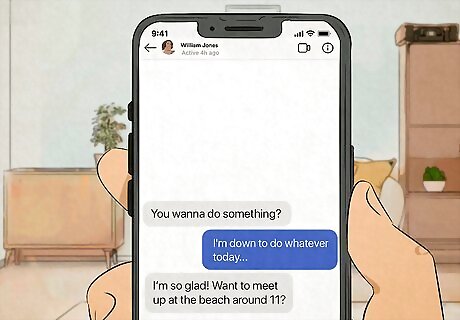
Express your excitement about the activity you’re going to do. When your friend says “I’m down” after you ask them to hang out and go somewhere, respond back with happiness that they’re joining in on your plans. You might also give them a few more details about where you want to go, what you want to do, and when you’re planning on hanging out. Your friend: “Yeah, I’m down to get drinks tomorrow night.” You: “Great! I can’t wait to hang out and catch up with you!” Your friend: “I’m down to do whatever today.” You: “I’m so glad! Want to meet up at the beach around 11?”
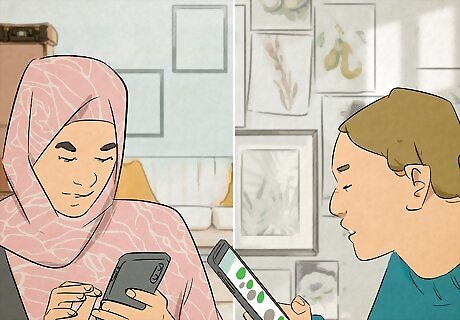
Comfort someone if they’re feeling sad. When your pal tells you they’re feeling down and upset, ask them if they want to talk and listen to what they have to say. Then, offer your support by telling them you’re sorry, hugging them, and asking what you can do to help them feel comforted. Your friend: “My dog passed away yesterday and I’m really down about it.” You: “I’m so sorry to hear that. I’m here for you if you want to talk about it.” Your friend: “I’m feeling down about Samira ending our relationship.” You: “It’s understandable that you’re feeling upset. Do you want me to come over? We can get out of the house or watch a movie.”
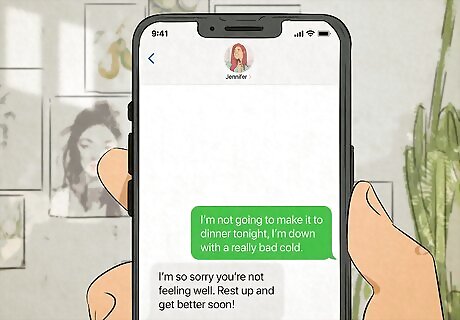
Offer your sympathy and help if someone is feeling sick. If your friend lets you know that they’re down with a cold or another illness, express your sympathy that they’re not feeling well. For example, you might say, “I’m sorry you’re feeling bad,” or “I hope you get better soon!” Then, help them feel better by offering to get them their favorite comfort food or to simply keep them company. Your friend: “I’m not going to make it to dinner tonight, I’m down with a really bad cold.” You: “I’m so sorry you’re not feeling well. Rest up and get better soon!” Your friend: “I haven’t felt this bad in so long. I think I’m down with the flu.” You: “I’m sorry you’re sick. I can stop by and bring you some soup, that always helps me feel better.”
Other Ways to Say “I’m Down”

“I’m up for it,” “Sure,” and “Let’s do it” also mean “I agree.” There are a lot of other casual ways to say you are open to hanging out or going somewhere with your friend. If you want to switch up your language a bit, use phrases like: “I’m up for it!” “Let’s do it.” “Sure!” “I’m in.” “Let’s go.” “I’m game!”
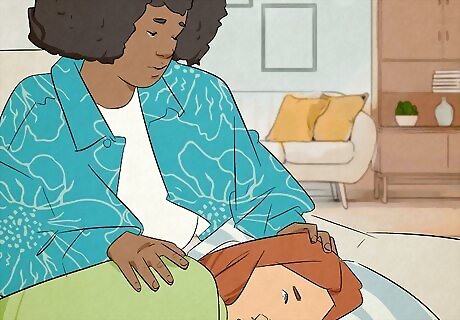
“I’m blue” and “I’m in a bad mood” also mean “I’m sad.” If you’re feeling really sad or depressed, you might say, “I’m feeling blue” or “I have the blues.” You might also say “I’m in a bad mood” in place of “I’m down” to let people know you’re upset or disappointed about something.



















Comments
0 comment